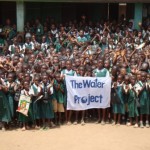This project was implemented by another partner, but is now monitored and maintained by The Water Project together with Mariatu's Hope.
The school had two dilapidated, unsafe pit latrines for the students. The well, which is an extremely busy school and
community well, had some problems with the lining and casing. New composting toilets were constructed. The lining in the well was repaired, as was the casing. A new Afridev hand pump was installed on the base and a lift kit was added to that to pump water to an overhead tank on the toilet building. The water is used to supply the two hand washing stations inside of the building. A wall was also constructed around the well.
A Sierra Leone team member stated, "The head mistress was so happy about this project and was so happy during the hygiene training. She is now in critical condition with a cancerous tumor. The teachers are very worried about her condition. She will leave a legacy to this school and this community as being a very active teacher and headmistress to bring such a wonderful project to this community for this generation and future generations." When the team arrived, community members were utilizing an unprotected spring to meet all of their water needs. The community’s use of this water source and their use of a covered pit latrine had left families suffering from cholera, dysentery, typhoid and malaria among other preventable water related illnesses. During the team's stay, community members assisted the team with the project whenever possible, provided food and security over the water project during the night. Most community members earn a living by working for the local government; some are police officers, teachers, tailors, carpenters and petty traders. The school is a primary school with 373 students; all who now have access to a clean water source and sanitary latrine. Before leaving the community, the team provided community member, Kadiatu Elizabeth Moseray, with a contact number in case their well were to fall into disrepair become subject to vandalism or theft.
The Sierra Leone team had an opportunity to meet with twelve year old community member and fourth grader, Musa Koroma, who stated, "The old toilet was disgusting and wasn't fine for good hygiene. The old toilet had no place to wash our hands. It is not spacious. The new toilet is very good for good hygiene. There is a sink with soap and water for us to wash our hands. We can practice good hygiene behavior. The facility is very decent."
During the hygiene education, the Sierra Leone team addresses: Hand washing, how to properly transport and store water, disease transmission and prevention, how to maintain proper care of the pump, as well as signs and symptoms of dehydration and how to make Oral Rehydration Solution. All of these lessons are taught in a participatory method to help community members discover ways to improve their hygiene and sanitation choices, and implement community driven solutions. After hygiene education, community members constructed a fence around the well site to keep livestock and wild animals away from their clean water source.
 WAsH for Schools
WAsH for Schools Rehabilitation Project
Rehabilitation Project












